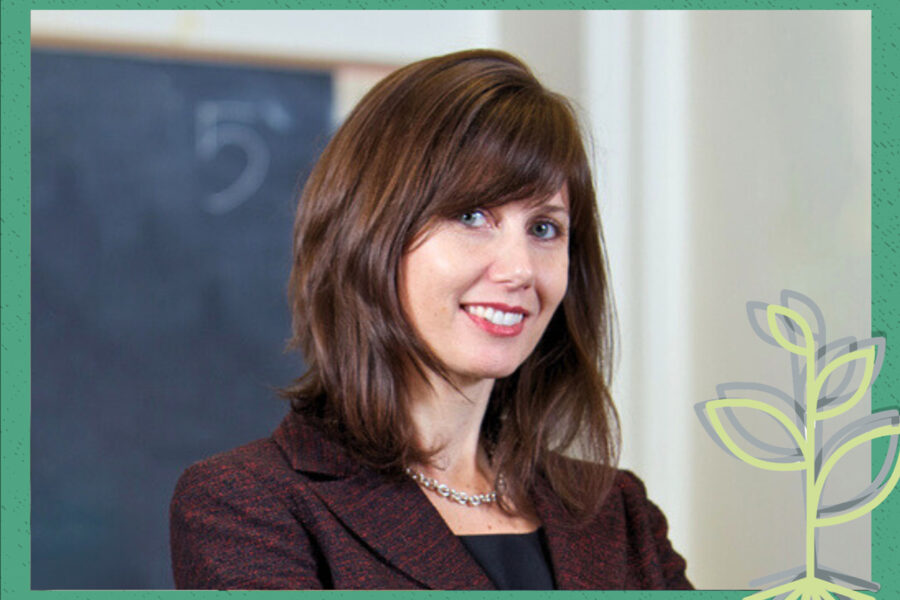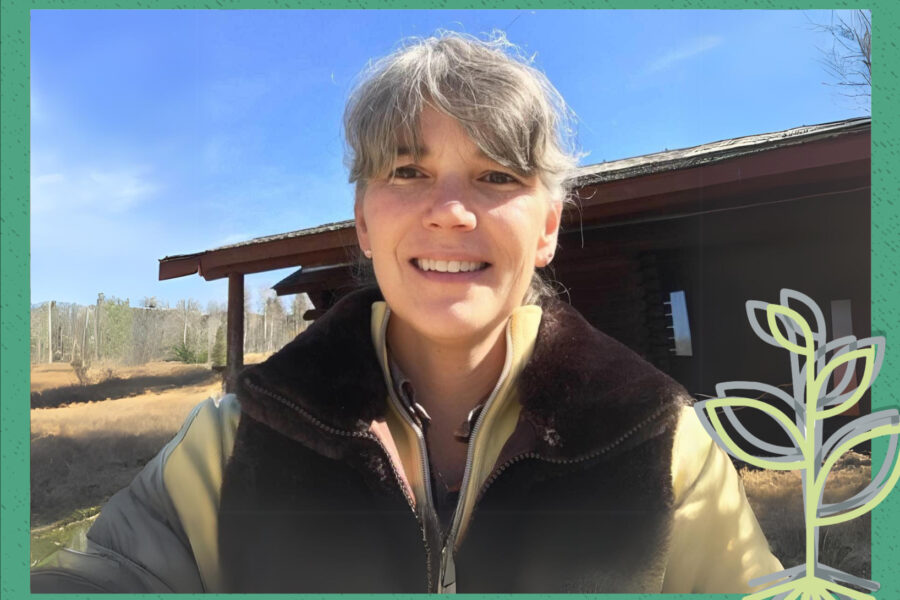Three writers reflect on how they approach the writing process—and whether creative writing can change the world for the better.
Episode Notes
In this special Big Idea episode, our editor, Johanna Case, revisits three of our favorite Seed Field Podcast interviews about creative writing and pulls out advice and wisdom useful not just for writers but anyone making art and making a life as an artist. From MFA Chair Lisa Locascio Nighthawk’s reflections on writing from a place of emotional truth to Colette Freedman’s advice for writers choosing what to write about and Alistair McCartney’s explanation of the power of defamiliarization, this episode explores some of the most potent ideas from our full interviews with each of these writers. And each writer starts to answer the question of whether creative writing can change the world for the better.
Lisa Locascio Nighthawk appeared on “S5 E9: Creative Writing Offers a Chance to Take Yourself Seriously.”
Colette Freedman appeared on “S4E8: Writing for Film and Stage Requires Collaboration—and Sometimes Just Doing It Yourself”
Alistair McCartney appeared on “S3E6: Stuck On Autopilot, We Ignore Daily Injustices. Can Art Shake Us Awake?”
Visit Antioch’s website to learn more about the MFA in Creative Writing that Lisa, Colette, and Alistair teach in.
This episode was recorded on January 19, 2024, via Riverside.fm and released on January 24, 2024.
The Seed Field Podcast is produced by Antioch University.
Guest Host: Johanna Case
Host: Jasper Nighthawk
Editor: Johanna Case
Digital Design: Mira Mead
Web Content Coordination: Jen Mont
Work-Study Interns: Sierra-Nicole E. DeBinion, Carrie Hawthorn, Stefanie Paredes, and Georgia Bermingham.
A special thanks to Karen Hamilton, Amelia Bryan, and Melinda Garland.
To access a full transcript and find more information about this and other episodes, visit theseedfield.org. To get updates and be notified about future episodes, follow Antioch University on Facebook.
Transcript – S6Bonus2 – Creative Writing at Antioch
[00:03] Johanna Case: Hi, I’m Johanna, and I’m usually the editor of the Seed Field podcast. But today I’m stepping in as the host because today we’re bringing you a special Big Idea episode and our topic is creative writing. I’ve been listening back to some of our favorite past Seed Field Podcast episodes around creative writing. And as I’ve been listening back to these episodes, I really found myself drawn into the different ways that our guests approach their specific creative practice and finding meaning in their work. Personally, I’m always interested in how different artists make time and space for their work, and especially how they continue to find value and purpose in their work in a world that can make it seem like you’re just adding to the noise and it might be better if you just said nothing at all. One voice that I thought really spoke to this was the novelist and writer Lisa Locascio Nighthawk. Lisa is the chair of the MFA in creative writing, and she’s a very accomplished writer. I love the way she talks about the experience of actually sitting down and working on her writing. In the first clip that I want to play, she talks about how she uses specific emotional states in her writing process.
[01:18] Lisa Locascio Nighthawk: I’ve written without looking at the screen. I’ve written feeling pain and hyperventilating. And I also, if I can say something absolutely like megalomaniacal, I believe that the humor in my writing is under remarked upon. So I’ve written lots of things that I think are very funny. I always just want to go towards the thing that’s making me feel, even if the feeling is bad. I feel like the worst thing in life for me is not feeling anything. And that is really how I would describe in some ways depression, and it can lead to this kind of panicky boredom. But I don’t really think that boredom is real. I think that we are full of curiosity and joy, and that we become separated from those things by the forces that we live with and under. So my writing is far from ecstatic. I’m sitting down and just joyously leaping out of my seat thinking about the tree I’m describing or whatever. It does feel like the really good thing that I can do, that only I can do in the way that I can do it, and that it is the thing that makes all other things possible. I think what speaks to me most about this is the way that she’s going towards feelings and using her own emotional reactions as her compass. And this ties into another thing that she says in the interview, where she talks about the power of writing to be a connector and to break down barriers between people. I don’t think that you need to have an experience to be moved by it or interested in it. But I think that if you don’t have the opportunity to learn about other people and their experiences, you become more isolated and ossified in your own subject position. And I think that’s where a lot of violence and pain begins. I think it’s an understanding that my own experience is very different from other people’s experience, and yet that I can connect with them and ideally be a tool of good through conveying the universality of writing’s ability to give voice to these widely disparate experiences that we’re all having on this planet. It has definitely charged my career as a writer with a sense of purpose because I do really believe in the power of reading and writing to destroy hegemony and liberate people from systems of oppression.
[03:55] Johanna: I love this idea of using writing and reading as a tool to liberate us from systems of oppression. And I love a little later in the interview how Lisa ties this into her work as the chair of the MFA in Creative Writing.
[04:08] Lisa: For me, being in charge of a program with a social justice mandate means being the administrator who makes room for and creates space and encourages the expression of these really different subjective experiences through education in writing that hopefully empowers us in that direction. And it’s my hope that whether it’s my writing or my teaching or my administrative work that I’m making the world a place that is more hospitable and more curious and more interested in each other and less walled off and separate.
[04:54] Johanna: This is a good place to bring in another voice, that of Colette Freedman, who’s the dramatic writing program officer at the MFA. In this first clip I want to play, Colette talks about her advice to students who are stuck or don’t know what they want to write about. And like Lisa, she suggests that they start with their emotions and their body to find what they really care about and need to write about.
[05:18] Colette Freedman: A lot of times people are stuck. I don’t know what to write. I don’t know what to write. So I say, make a list. I will encourage each person to follow his or her list, but make a list of what you’re incredibly passionate about and not from the neck up. Intellectually, we’re all passionate about things. People can talk about politics forever. People can talk about race relations forever. From the neck up, where does your body stand? Where does your body feel sick to its stomach when it hears things or this really feels incredibly angry when something happens? That’s where you have to start because it means you can’t not tell that story.
[05:58] Johanna: The interview with Colette talks a lot about her own experience as a playwright and a screenwriter, how she’s come to this work and the successes that she’s had. I especially like the clip that I’m going to play now where she talks about the importance of celebrating your successes as a creative person. And she shares a really beautiful strategy for how to celebrate those milestones.
[06:20] Colette: I would say to people, when something wonderful happens, and it doesn’t have to be a premiere at a big festival, it could be writing the end. It could be any success. It doesn’t matter how big or little, but something that makes you feel wonderful artistically. I would say buy a plant. So buy a 99 cent plant at Lowe’s or it doesn’t even have to be at a nice garden because every time you look at that plant, you think, oh, I finished a play. Oh, I finished my novel. Like it’s just a really nice physical manifestation of the success you felt in that moment that you can water and nurture like you’re watering and nurturing your creativity.
[07:06] Johanna: I love this very practical and sweet practice. Now I want to turn to an interview we did with Alistair McCartney, who is teaching faculty in the MFA program. In this interview, Alistair talks about the concept of defamiliarization, the way that literature can help us see the world more clearly by taking things that we’re familiar with and revealing their strangeness again, like it’s the first time we’re seeing them. The idea of defamiliarization is drawn from an essay by Victor Scholovsky, but you don’t have to read it to find this conversation illuminating. Here is Alistair talking about what excites him about defamiliarization.
[07:48] Alistair McCartney: I would say the simplicity and the clarity of the concept really struck me in terms of the function of writing, just this idea that is imparting that as humans, we tend to become very numb to the world around us and habituated to it. And then our task as writers is simply to refresh readers’ memories and alertness to the stoniness of the stone and the thinness of things to the world around them, both on a very immediate level, but then also it has much broader implications in terms of thinking about the politics of the world. And defamiliarization definitely has a social function as well.
[08:28] Johanna: One of the interesting parts of the conversation was when our host Jasper Nighthawk pushed Alistair to talk about whether literature, or at least defamiliarization, can help make the world a better place. And Alistair pushed back on the idea that merely reading or consuming art magically makes us better people.
[08:47] Alistair: Yeah, personally, I often find myself quite skeptical of the notion that writing and literature intrinsically makes better humans. Another writer-theorist philosopher with a big impact on me as an undergrad was George Steiner, you know, who was writing about literature and the Holocaust and really wrote about the idea that, you know, the Nazis would be working in the concentration camps during the day and then would go home at night and read Goethe and Rilke and listen to Beethoven. So it kind of really schooled me in the idea that, yeah, literature has some kind of intrinsic value that somehow, you know, creates greater empathy in us. But I love the fact that you kind of in some ways remind me that in terms of Shklovsky’s notion that, yeah, perhaps we can’t make such grand claims about writing or literature, but we can think about it in a more micro sense, just these specific techniques we can enact to at least on a psychological or a phenomenological or perceptual level just to make us pay more attention to the world. And that perhaps that is kind of a small way of beginning to then be more, as you say, more receptive to the world around us.
[10:05] Johanna: And Alastair gives us an example of how this might work when he talks about the novel Beloved by Toni Morrison, a widely celebrated work of literature that many people have said helped them understand slavery and its after effects in a deeper way. And he says part of how she does this is by forcing the reader to view slavery and its scars with fresh eyes.
[10:27] Alistair: Toni Morrison and her novel Beloved is one I’ve used recently as an example of a writer enacting defamiliarization. And in terms of then her use of defamiliarization specifically and how it relates to the connection between writing and social justice, Shklovsky is really clear that the function of defamiliarization is for the writer to both present to the reader things anew. So the layers of mystification we have in front of our eyes about certain things we might take for granted is stripped away. And also for us to be witnesses, to be watchers. So clearly I think Morrison in Beloved in her unique way was really writing and defamiliarizing and imparting multiple techniques, working on many levels to present to the reader the horrors of slavery as if we’re encountering them for the first time and as if we’re somehow encountering them both as insiders and outsiders. And you know I don’t have that passage in front of me right now, but what I would say Morrison does is that she just tackles language at such a heightened level. Beloved, every sentence is operating at this level that’s almost like electricity, it’s really, really heightened. And she shifts dynamics all the time and moves between a more objective way of describing things into a much more sensuous way. And she moves back and forth between horror and beauty in a way that’s really complicated. So it’s very dazzling and I think it’s just constantly forcing the reader to relate to the horror she’s describing in this very material and corporeal and profoundly embodied way.
[12:22] Johanna: Between Alistair’s idea of defamiliarization, Colette’s advice for writers choosing what to write about, and Lisa’s reflection on writing from a place of emotional truth, these writers give us so much to carry into our own creative practice.
Of course, these are short excerpts from our longer conversations with each of these guests. If some part was interesting or spoke to you, I encourage you to go listen to the full podcast episodes. We’re including links to these three episodes in our show notes. We’ll also link in our show notes to the program page of the MFA in creative writing, where you can find more information about studying creative writing at Antioch. We post these show notes on our website, theseedfield.org, where you’ll also find full episode transcripts, prior episodes, and more.
The Seed Field podcast is produced by Antioch University. I’m Johanna Case and I edit the show. Our regular host is Jasper Nighthawk. Our digital designer is Mira Mead. Jen Mont is our web content coordinator. Carrie Hawthorne, Stephanie Paredes, and Georgia Bermingham are our work-study interns. A special thanks to Karen Hamilton, Amelia Bryan, and Melinda Garland.
Thank you for spending your time with us today. That’s it for this episode. We hope to see you again next time. And don’t forget to plant a seed, sow a cause, and win a victory for humanity. From Antioch University, this has been the Seed Field Podcast.




